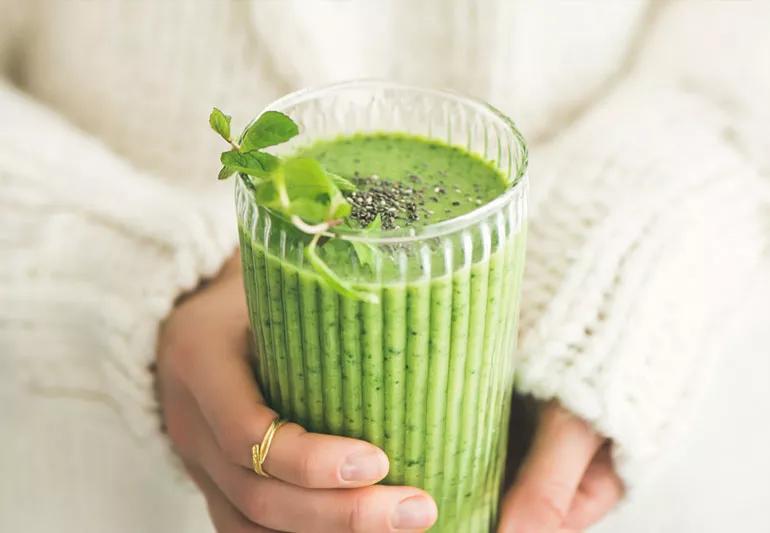The many ways to get the health benefits of amazing matcha tea

Image content: This image is available to view online.
View image online (https://assets.clevelandclinic.org/transform/ba831281-e3c7-4730-a14c-ef4486a7d9a9/matchaSmoothie-916303446-770x533-1_jpg)
woman holding matcha smoothie
You know matcha when you see it. Matcha is a highly concentrated uniquely vibrant green tea that also often comes in a powdered form from finely grinding condensed dried green tea leaves.
Advertisement
Cleveland Clinic is a non-profit academic medical center. Advertising on our site helps support our mission. We do not endorse non-Cleveland Clinic products or services. Policy
Matcha has a good amount of theanine in it — an amino acid that partly gives matcha tea its umami (distinctively pleasant and savory) flavor. Its origins go back to ancient China but matcha has been consumed and celebrated widely in Asian and non-Asian cultures alike.
It’s most commonly known as the green tea used widely in Japanese tea ceremonies. Japanese Zen monks have also used it to stimulate alertness because of its uniquely high caffeine content.
“Green tea matcha also powder packs a pretty fierce nutritional punch,” says dietitian Julia Zumpano, RD, LD.
Matcha tea has unique health benefits when compared with most other teas.
Advertisement
Matcha of any kind can be enjoyed deliciously in different ways. A little goes a long way — not only because it has such a savory flavor but also because it’s packed with all those nutrients.
Quality matcha is easily detected with a general rule of thumb — the greener, the more delicate the flavor, the better. It’s also pricier due to more meticulous production methods that preserve its hue and complex flavor.
Higher-grade matcha is generally more vibrantly green as a result of being dried in shade rather than sunlight. More expensive matcha also uses younger leaves formed at the top of the plant, which give it a much more delicate flavor.
That’s why higher-quality matcha is more suited to be enjoyed simply as tea. (Check your labels to make sure you’re not getting low-quality matcha with food coloring instead!)
“When you’re shopping for matcha, you’ll want to know what you’re getting, and the kind you should buy depends on how you plan to use it,” Zumpano says.
When you aren’t looking for high-grade matcha tea for drinking daily, Zumpano shares some of her other favorite recipes that wrap in this healthy, savory green tea powder.
Add matcha powder to your favorite smoothie recipes. Or try adding ½ tsp. of matcha to 1 cup of spinach, ½ cup almond milk plus your favorite fruit (banana, berries, apple, pineapple, mango) with ice for a creamy-smooth way to get a dose of antioxidants.
Combine chia seeds with a little almond or coconut milk. Mix in matcha and top with fruit, nuts or coconut.
Add matcha into homemade soups. It’s especially good in cucumber and asparagus soup recipes to deepen the flavor.
Sprinkle matcha into your homemade guacamole for a tastier, richer flavor to scoop up with your chia chips.
Heat ¾ cup almond or coconut milk. Mix in 1 tsp. matcha for your instant favorite beverage to get your day going (or halfway through). Remember though, matcha is full of caffeine so keep your matcha intake earlier on in the day.
Try this simple no-cook recipe. Combine 2 cups natural, unsalted, chunky peanut butter with 2 Tbsp. ground flax-seed, ½ cup dried apricots + 1 Tbsp. amber honey — then add matcha to taste. Roll out balls on parchment paper and refrigerate for a healthy, high energy snack.
Advertisement
“Matcha is one of the most versatile flavors out there and adds a pleasant flavor to pretty much anything it goes into,” Zumpano says. “That means you can add its health benefits daily to your diet in so many ways.”
Advertisement

Sign up for our Health Essentials emails for expert guidance on nutrition, fitness, sleep, skin care and more.
Learn more about our editorial process.
Advertisement
The tropical fruit is a good source of antioxidants and vitamin C
High amounts of cholesterol and saturated fat in red meat may be linked to heart disease
The leaves and pods from this tree are rich in essential nutrients
This starchy root vegetable is a staple in many global cuisines — but it has to be prepared correctly, or it can cause serious concerns
These delicate green sprouts can give you an extra dose of vitamin K and other nutrients — but they’re not safe for everyone
Edamame, lentils and chicken breast are good sources of protein
Eating this root vegetable can help support your eye, heart and brain health
The flavorful herb is full of antioxidants that may help regulate blood sugar
Although it could be used as a moisturizer, this new trend is not recommended
Communicating clear limits helps protect your time, energy and emotional well-being
High cholesterol can be genetic, but testing and treatment can lower your heart disease risk